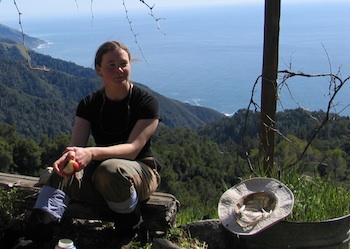When Susanna (Sus) Danner (Class of 1997, Double major in Environmental Studies and Biology) was at UCSC she had the chance to take field courses, including Field Methods and a Plant Conservation seminar, as well as participate in a diverse set of research projects studying rare plants, rodents, and bees. She credits these hands-on experiences with providing the basis for her successful conservation career, which has led to her current position as Director of Protection for the Idaho Chapter of The Nature Conservancy. She leads a statewide program to protect natural areas and habitat for plants, animals and natural communities through conservation easements, purchases and cooperative projects.
Recognizing the critical role of experiential learning in her own life, Sus has made a $1,000 donation to the Environmental Studies Experiential Learning endowment. She says, “I support the campaign because I wouldn't have the career in conservation I have today if it weren't for the strong foundation of field ecology I learned at UCSC. Books alone wouldn't have given me the context or the adaptability I learned in the field. I want to give future UCSC students the advantages of field training in environmental studies that I was so lucky to have benefited from.”
After graduating from UCSC, Sus worked for the Coastal Watershed Council managing five citizen science programs conducting watershed monitoring in the Central Coast of California. She then served as Conservation Project Manager for five years with the The Big Sur Land Trust, where she helped to acquire and monitor conservation lands. In 2007 she took the job in Idaho because of the much larger scale at which she could affect conservation decisions. She regularly brokers deals with private landowners, businesses, and cooperating agencies to implement and finance land and water protection. In 2010 her program protected more than 21,000 acres at a value of more than $17 million. She and her team of staff and technical experts have designed conservation projects that rewater dry Chinook salmon streams, protect grizzly bear migration routes, and conserve grasslands for nesting long-billed curlew.
Her job requires her to use many of the skills she learned at UCSC, including field monitoring, experimental design, teamwork, plant and animal identification, problem solving, and writing. These skills are best taught in hands-on courses where students can interact closely with instructors and teaching assistants, and get into the field.
Given the recent pressures to increase enrollments, the Environmental Studies faculty have launched an endowment campaign to support internships, labs, and hands-on courses across the curriculum for UCSC students. All the current faculty, along with several emeriti faculty and a growing number of alumni, have donated to the endowment. To date they have raised ~$70,000 which will be matched by a generous alumnus. For more information on the endowment or to donate go to the Experiential Learning Endowment web page.

